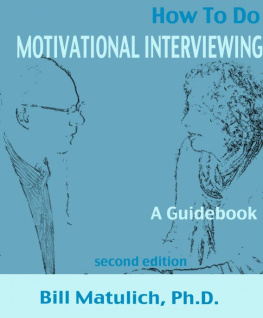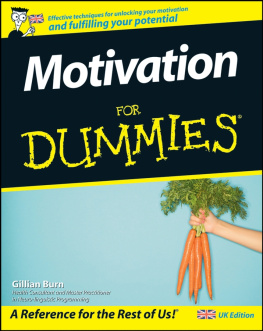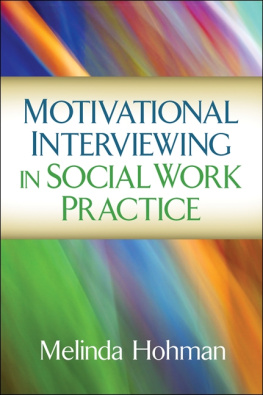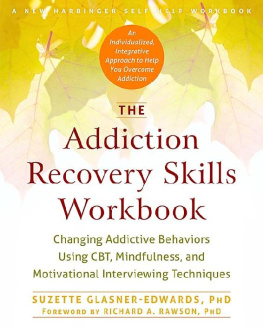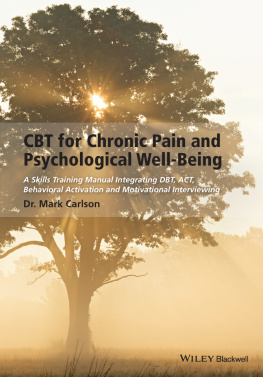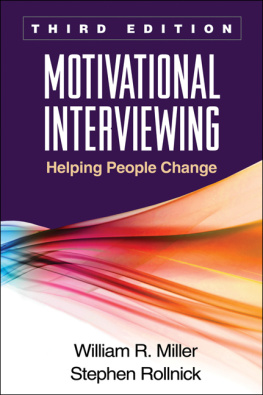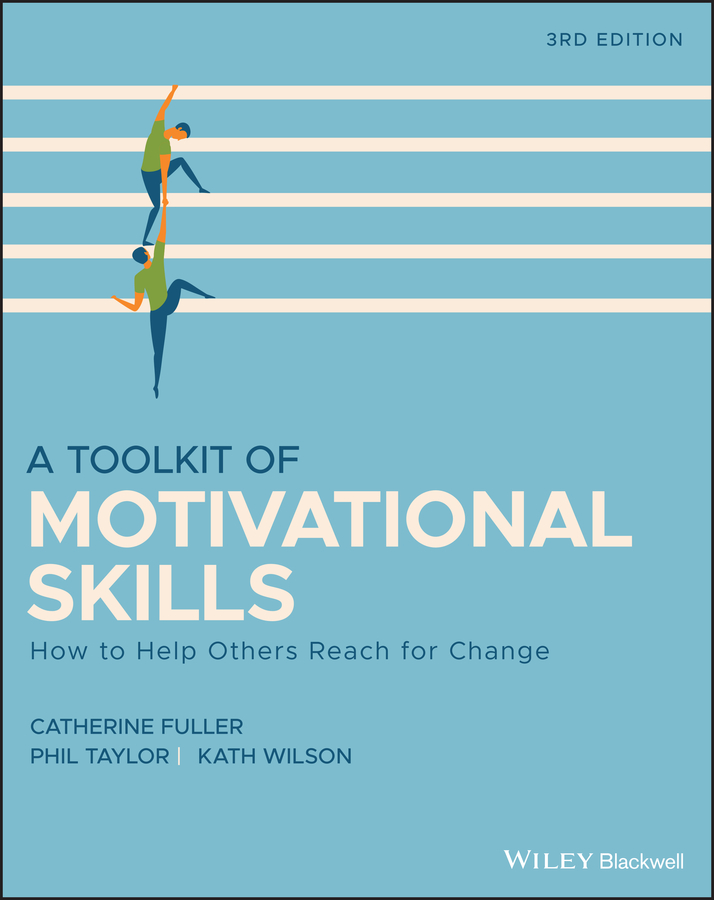
Table of Contents
Guide
Pages
A Toolkit of Motivational Skills
How to Help Others Reach for Change
Third Edition
Catherine Fuller
Phil Taylor
Kath Wilson

This edition first published 2019
2019 John Wiley & Sons Ltd
Edition History
WileyBlackwell (2e 2008)
All rights reserved. No part of this publication may be reproduced, stored in a retrieval system, or transmitted, in any form or by any means, electronic, mechanical, photocopying, recording or otherwise, except as permitted by law. Advice on how to obtain permission to reuse material from this title is available at http://www.wiley.com/go/permissions.
The right of Catherine Fuller, Phil Taylor and Kath Wilson to be identified as the authors of this work has been asserted in accordance with law.
Registered Office
John Wiley & Sons Ltd, The Atrium, Southern Gate, Chichester, West Sussex, PO19 8SQ, UK
Editorial Office
111 River Street, Hoboken, NJ 07030, USA
For details of our global editorial offices, customer services, and more information about Wiley products visit us at www.wiley.com.
Wiley also publishes its books in a variety of electronic formats and by printondemand. Some content that appears in standard print versions of this book may not be available in other formats.
Limit of Liability/Disclaimer of Warranty
While the publisher and authors have used their best efforts in preparing this work, they make no representations or warranties with respect to the accuracy or completeness of the contents of this work and specifically disclaim all warranties, including without limitation any implied warranties of merchantability or fitness for a particular purpose. No warranty may be created or extended by sales representatives, written sales materials or promotional statements for this work. The fact that an organization, website, or product is referred to in this work as a citation and/or potential source of further information does not mean that the publisher and authors endorse the information or services the organization, website, or product may provide or recommendations it may make. This work is sold with the understanding that the publisher is not engaged in rendering professional services. The advice and strategies contained herein may not be suitable for your situation. You should consult with a specialist where appropriate. Further, readers should be aware that websites listed in this work may have changed or disappeared between when this work was written and when it is read. Neither the publisher nor authors shall be liable for any loss of profit or any other commercial damages, including but not limited to special, incidental, consequential, or other damages.
Library of Congress CataloginginPublication data is available
9781118510292 (paperback), 9781118510230 (ePDF), 9781118510254 (ePub)
Cover Design: Wiley
Cover Illustration: Nechayka/Shutterstock
Courtesy of David Thompson
About the Authors
Catherine Fuller MA, BSc (Hons) CQSW, PGCertEd is a former senior manager, staff developer and practitioner within the National Probation Service of England and Wales. She now runs an international training consultancy. She helps practitioners, their managers and employers in a variety of settings, develop skills, understanding, and confidence to facilitate change in others.
Catherine and Phil were at the forefront of developing motivational work with offenders in England and Wales and Catherine has since helped to establish motivational approaches within the staff training curriculum of new prison and probation services of Turkey, Serbia, Albania, Georgia, Kazakstan, Macedonia, Bulgaria and Romania.
Information about training packages based on this book is available from:
Catherine Fuller Associates
01886821403

Phil Taylor, BA (Hons), originally trained as a professional engineer, then made a career in the probation service as probation office manager and trainer. Later Phil had his own training business working in the criminal justice sector across England and Wales. On retirement he completed a Creative Writing and Art degree. Phil has a concern to describe complex ideas in ways that can be easily understood by practitioners.
Kath Wilson, M.A, B.A (Hons), CQSW, PGDipEd, is a Senior Lecturer in Community Justice and leads the probation programme at De Montfort University. Previously a probation officer, she teaches mainly around issues of values, diversity, and change within the Criminal Justice System, particularly in relation to probation and policing. Kath has helped develop the professional and practice development curriculum at De Montford University as well as materials for distance learners and has worked towards widening participation for probation programmes. She has carried out research within both Children's Care Homes and the Police Service including evaluating the use of restorative approaches to reduce escalation of risk.
Preface
It has been 10years since the second edition of A Toolkit of Motivational Skills was published and it feels like a timely point to develop this third edition.
The book reflects development in the authors' thinking as well as responding to the constructive feedback we have received on the second edition from individuals, trainers, and mentors, for which we are grateful.
The use of a motivational approach has undoubtedly grown over this period with a wider audience than originally envisaged in the second edition. Both organisations and individual practitioners have developed their skill base to address many different concerns. Motivational skills are now widely used in health, education, social work, probation, and work with alcohol and substance use. They are also increasingly used in a range of other settings, such as the business world. We know for example that parents and guardians have found the book useful in the approaches they use with children and to reduce conflict in the household.
The focus remains on a user friendly and accessible toolkit where people can follow through the motivational sequence by chapter or dip in and out as they wish. We have retained the key aspects of the book in terms of advice, guidance, and practical exercises to help in the development of skills for motivational work.
We have developed new online resources and the website now contains easily printable exercises that trainers and mentors can access. Those who are developing these skills independently will find them user friendly. There are also several video clips that show readers how some of the skills might look in practice. There are examples of interviews both with and without motivational skills to generate ideas about how to integrate these techniques into practice.
Readers may just want to view the clips in their own time or use the accompanying analysis and teachers notes as an aid to learning, either individually or in group work. The website contains trainer's guidance on how some of the video clips and exercises might be used. The trainer guidance is designed so that those using the book as a teachyourself resource will find them helpful.
Next page

